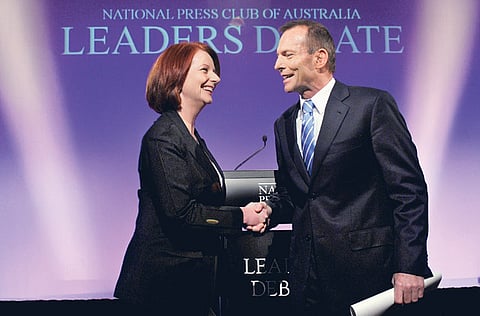Australia's kingmakers
The trio who will decide the election are anti-politicians with big electoral majorities who made their careers by snubbing the big parties

The maverick anti-politicians that will decide the outcome of the Australian election pose a challenge for Julia Gillard and Tony Abbott. One is a whip-cracking, larrikin cowboy, another a surfer with a social conscience, the third a hard-nosed farmer. Throw in a defence department whistleblower, add a tyro Green MP for good measure and there you have the cast of characters who will decide the shape of Australia's new government.
As the acting prime minister, Gillard and her conservative nemesis, Abbott, commence the vexed task of trying to pull together a workable minority government, the spotlight has narrowed to the blokes from the bush who hold the keys to the Aussie prime ministerial residence, known affectionately as The Lodge.
Truly independent
This gang of three — Bob Katter, Rob Oakeshott and Tony Windsor — are veteran anti-politicians, mavericks with big electoral majorities who have entrenched their support by snubbing the big parties. They are truly independent independents, ferocious about the political mainstream's failure to deliver for their rural constituencies and impatient for a time when they could join forces to exert some real political muscle.
All three, in fact, hail from the National party, the rural arm of the Australian conservatives. A done deal for the aspiring rightwing PM, Abbott? Not a chance.
Hatred of their political almae maters is their only real common bond and the feeling is mutual. Katter, whose electorate covers almost one third of the enormous state of Queensland, dumped the National Party on the eve of the 2001 election, launching a scathing broadside against the former Howard government, economic rationalism and its failure to support the tobacco farmers of his constituency. His campaign ad during this race became something of a YouTube hit, a mini western starring the MP as "the force from the north".
Windsor, too, began his career as a Nationals candidate but abandoned his party pre poll, winning a seat in State parliament where he held a massive majority for a decade and the balance of power for a controversial term. He switched to the national stage in 2001, wresting a key blue-ribbon seat from the conservatives.
On election night last Saturday, Windsor, never one to mince words, described a National Party colleague as a "fool" on live television while Katter struck terror into the hearts of the conservatives, accusing the Nationals' leader, Warren Truss, of a back-handed personal attack. (Abbot has now been forced to ban his aspiring deputy PM, Truss, from negotiations thanks to the hostility between him and the kingmakers.)
Oakeshotte is the youngest of the three renegades. At 40, he is a fit and passionate surf kayaker and triathlete and, probably, the least problematic character for both parties. Something of a David Cameron-style Tory, economically dry but with a strong commitment to social issues, he has shown initial signs of a gentler pragmatism.
Rise of the Greens
Managing the trio's individual and collective demands will be difficult enough without the other revolution that swept through the Senate last Saturday. Disappointment with both parties' failure to address the deadlock over climate change and a proposed carbon emissions tax saw a massive increase in electoral support for the Greens so big that the environmental movement, for the first time, will now hold the balance of power in the upper house, Australia's influential house of review.
Gillard and Abbott were right to hold their breath in the vain hope that the final count will deliver the magic 76 seats needed to form a majority government outright. The former faces becoming the nation's first female PM held to account by three, uber conservative, veteran male MPs while the latter risks going down in history as the conservative prime minister who described global warming as "crap", and had to stare down a Senate in the hands of the Greens.
The irony is breathtaking. And of course, quite delicious.
Paola Totaro is the London-based Europe correspondent for the Age and the Sydney Morning Herald.



